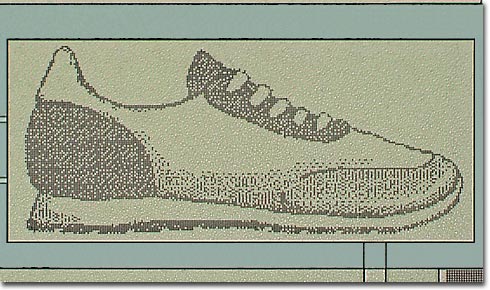The Marathon Sneaker (Brightfield)
|
This dirty sneaker was found in the closet on a Hewlett-Packard "Marathon" chip that is part of the Hyperdrive HCRX, an older high-end 3D graphics system. The Marathon chip is actually the video RAMDAC (Random Access Memory Digital-to-Analog Converter), an integrated circuit that converts the digital display information into an analog signal to drives the computer monitor. This chip supports four color maps, 8-bit color recovery, a hardware cursor, and stereo display. Robin Miller has pointed out to us that an identical sneaker image was first used by Apple to demonstrate the remarkable graphics capabilities of the first Macintosh computers in 1984. We are told that design engineer Frank Baszler was responsible for placing this shoe on the chip. Frank is also the designer who originally wrote the software used to convert bitmapped images into contact arrays that are used so effectively in much of the beautiful HP chip artwork found in the Silicon Zoo. Hewlett-Packard engineer Rick Butler loaned us this chip, along with the Thor: God of Thunder chip that contains the famous Norse god. Rick was also instrumental in providing us with information about the "sunken via" (also known as "contact array") method of creating these doodles as revealed in our interactive Java tutorial on building a silicon Yin Yang, and other general discussions about silicon artwork. View this silicon artwork under differential interference contrast and darkfield illumination. |
© 1995-2025 by Michael W. Davidson and The Florida State University. All Rights Reserved. No images, graphics, software, scripts, or applets may be reproduced or used in any manner without permission from the copyright holders. Use of this website means you agree to all of the Legal Terms and Conditions set forth by the owners.
This website is maintained by our
|
